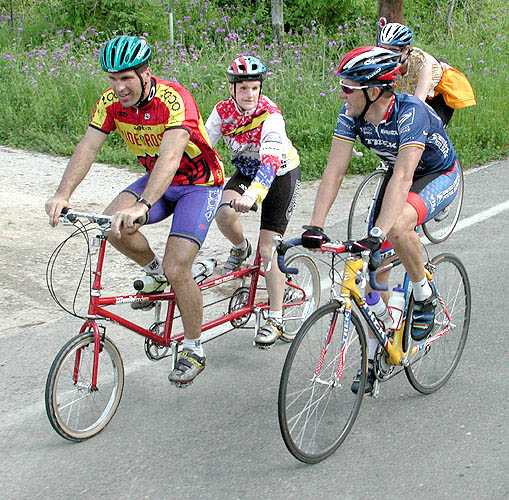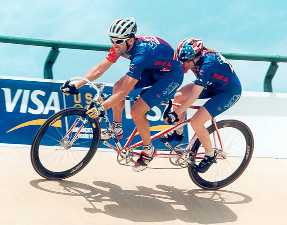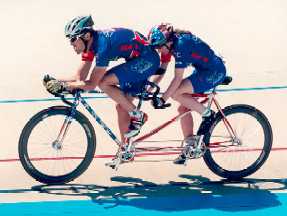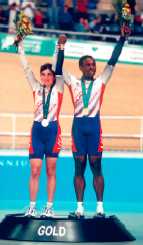| TELEGRAM & GAZETTE Worcester, Mass. April 29, 2001 |
|
Blind tandem racer with cancer sees it through
By Lynne Tolman Blind tandem racer Cara Dunne-Yates posted track speeds last
spring that earned her a spot on the U.S. team that competed in October at
the 2000 Paralympic Games in Sydney, Australia. And in Sydney, she and
partner Scott Evans were riding as fast as they had in the 1996
Paralympics in Atlanta, where they won a silver medal in the kilo and a
bronze in the 200-meter sprint.
But the level of
competition had been kicked up a notch. "I just wasn't feeling like I had
that magic in my body that I used to have. I couldn't put my finger on
it," Dunne-Yates said. She'd had a baby in January 2000, and nursed
through the summer while living in Colorado Springs, Colo., and training
at the Olympic Training Center there, "and I thought I was just
tired."
Then, in Sydney, she felt a lump in her abdomen.
Back home, medical tests ensued, and on Dec. 26 she had surgery to remove
a cancerous tumor. It was a sarcoma.
Dunne-Yates, 31, had
survived two cancers already. She lost her eyesight at age 5 to retinal
cancer. A related bone cancer in her face eight years ago cut short a ski
racing career that included three silver and two bronze medals at the
Paralympics in 1984 and 1998.
In between the two cancers,
she graduated from Harvard College, and after the second cancer she earned
a law degree from UCLA, where she got into bike racing. With the latest
diagnosis, she was on a plane to Boston within a week to see her sarcoma
specialist at Massachusetts General Hospital.
Now
Dunne-Yates is undergoing chemotherapy at Mass. General and living with
the Laborde family in Oakham, along with her husband, Spencer Yates, and
their daughter, Elise. Yates is a competitive cyclist and former ski
racer, too. He and met Dunne at the U.S. Paralympic Trials in 1996, when
he was piloting blind cyclist Matt King, and they got married in
1998.
This month, complications landed Dunne-Yates in the
hospital in Worcester for six days. Regaining her strength last week at
UMass Memorial Medical Center/ University Campus, she reflected on past
and future challenges, on and off the bike.
Part of the
emotional turmoil in Sydney was watching U.S. riders Pam Fernandes and Al
Whaley win a gold medal in Dunne-Yates' best event, the mixed tandem kilo.
Of course Dunne-Yates was pleased for her teammates, but it's no secret
that on the track she and Fernandes are fierce rivals.
Fernandes, 39, who lives in Needham, has been blind since age 21 from
diabetes. Her gold-medal performance in Sydney came despite breaking her
foot 10 days before the race, and set a world record for the kilo.
Fernandes and Whaley also won a silver medal in the sprint.
"Pam and I both have these really wild medical recovery
stories, and we have similar challenges, being blind," Dunne-Yates said.
"I learned a lot from Pam. She's been racing longer than I have. But you
can't help having some tensions there. You know, we're not just competing
for results. We're competing for attention, we're competing for money,
even sometimes competing for partners."
Tensions between
the two blind stokers came to a head at the 1998 World Cycling
Championships for the Disabled in Colorado Springs. Their qualifying times
pitted the two against each other in the sprint quarterfinals. Evans
maintained that cycling etiquette called for Fernandes and her pilot,
Kenney Williams, to forfeit at the starting line, allowing their teammates
with a better qualifying time to advance to the semifinals and a chance at
a bronze medal without expending precious energy in the heats.
Instead, it was agreed that the two pairs would race, but
Fernandes and Williams would let Dunne-Yates and Evans win. That's what
happened, but Dunne-Yates felt that Fernandes and Williams raced too hard.
She said they only backed off in the final seconds, unnecessarily tiring
Dunne-Yates and Evans, who then lost in the semifinals.
Ultimately, Dunne-Yates put aside any hard feelings in favor of teamwork.
"In Sydney, Scott and I felt like, 'Why should we help them?' But we did;
we worked really hard to work their rivals, wear them out. And they
thanked us, and it all ended up good," Dunne-Yates said.
Fernandes said she respects and admires Dunne-Yates for her strength and
focus, and any rivalry between the two is only on the track. "I'm hoping
she can take this competitive streak of hers and apply it to fighting this
disease," Fernandes said. "And if I know Cara ... she'll come out a
winner."
Three weeks ago in Austin, Texas, Dunne-Yates
received the Carpe Diem Award for "the spirit of survivorship" at a
fund-raiser for the Lance Armstrong Foundation. For part of the Ride for
the Roses, she and her husband were spinning on a foldable tandem
alongside Armstrong, two-time Tour de France winner and a cancer survivor
himself.
Armstrong said to them, "Sure have to hand it to
you guys for riding tandems on tracks."
On June 23, the
Institute for International
Sport will induct Dunne-Yates into its International Scholar-Athlete
Hall of Fame, in a ceremony at the University of Rhode Island. She's happy
for the chances to remind people that people with disabilities can be true
competitors, but "I don't need galas," she said. "Sometimes I just want to
be anonymous and nondescript. I'd just be kind of average but there
wouldn't be any of this hard stuff."
As for the future,
Dunne-Yates wants to write her autobiography, and she could always put
that law degree to use. She's not sure whether she'll aim for the elite
ranks of cycling again.
"While it's fun to race at that
level, it's really hard to make a commitment," she said. "I'm looking
forward to getting fit again, for health and for the fun of it, and
spending time with the baby. I could be happy with weekend races, I really
could -- for a while."
She figures she's young enough
that her options are open, should the competitive itch resurface. "Look,
Pam's 40," she said. "But when you deal with these illness things, you're
trying to get over one hill first."
More photos by Mike Gladu -- click on photo for larger view
Lynne Tolman's bicycling column archives
Lynne Tolman's home page



